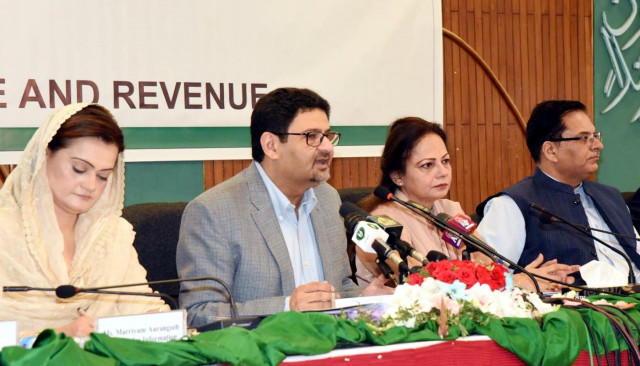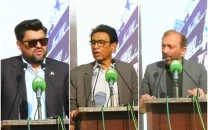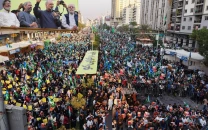Miftah makes pitch for hike in fuel, power prices
Finance minister vows to take tough decision to avoid Sri Lanka-default

Finance Minister Miftah Ismail on Saturday declared that budget consolidation was his first priority to avoid a Sri Lanka-like default.
This is a clear indication that the coalition government has decided to take tough decisions and face the consequences of a low economic growth and high inflation.
“[High] growth and [low] inflation are our targets, but our first target is fiscal consolidation to move the country away from the point where Imran Khan had left it,” said the finance minister while vowing to take all decisions no matter how difficult to save the country from a looming default.
He said that the government’s second target was to give relief to the poor people and for which we are taking difficult decisions.
In his post-budget news conference, the finance minister spoke about his government’s priorities, but the topics that he picked did not mention areas where the government needed political muscles.
Finance Minister @MiftahIsmail addressing a post #budget conference in Islamabad@CMShehbaz @Marriyum_A @AishaGPasha #Budget_for_economic_stability #WeHaveWeCanWeWill https://t.co/xOpTed8qCi
— Radio Pakistan (@RadioPakistan) June 11, 2022
His government could not dare withdraw Rs26.3 billion income tax benefits availed by a handful of investors in the Real Estate Investment Trusts (REITs) schemes from just two cities. The government also did not withdraw Rs347 million tax benefits availed by the judges and Rs170 million by the bureaucrats.
Also, despite the “difficult” steps that the finance minister mentioned, there still exits gaps in the assessments made by the International Monetary Fund (IMF) and the one by the government side.
And to reach a staff-level agreement on policies and reforms needed to complete the sixth review under the $6 billion Extended Fund Facility (EFF), which has been 'in recess' since April, the gaps have to bridged.
“So far, there is nothing on the IMF agreement and we are trying to protect the people earning from Rs100,000 to Rs200,000 a month from tax raise,” said the finance minister while addressing the post-budget conference.
The government’s decision to cut tax rates of the salaried class is against the IMF recipe that wants a significant increase in the tax slab instead. The government has also restored some of the sales tax exemptions that had earlier been withdrawn under the IMF package.
“These issues are expected to create ripples in the IMF camp,” according to sources.
The finance minister admitted that the IMF was not happy about some tax measures.
From the beginning Miftah made the case for taking difficult decisions and said more than once that the country may default if difficult steps were not taken and the losses of the power and gas sectors were not stemmed.
He warned that the country was going through an unprecedented period which, he termed, he never saw in the past 30 years.
“If I do honest accounting, I will also have to book the state-owned enterprises’ losses in the budget,” said the finance minister.
To a question, whether he will also honestly report defence-related expenditures that are in fact nearly Rs2.4 trillion or 25% of the budget, the finance minister replied that all defence-related grants were mentioned in the budget.
He insisted that the budget numbers were realistic and the finance ministry did not underreport the current expenditures figure on account of defence and running of the civilian government. “Even Rs200 billion provisions are made for any additional expenses, including increase in employees’ salaries,” he added.
“Pakistan can no longer afford to give Rs1.1 trillion electricity subsidies and also sustain Rs500 billion losses due to circular debt every year,” said Ismail while making a case for power tariff hike from the next month.
The National Electric Power Regulatory Authority (NEPRA) has determined to increase electricity prices by Rs7.90 per unit or 47%, which the government either has to notify within a month or make allocations in the budget to pay subsidies.
In the budget, the government has reduced the quantum of total subsidies by Rs800 billion or 54% to Rs699 billion, which does not leave a room for absorbing the price increase.
The finance minister also said that the losses in the gas sector were Rs400 billion a year and the government was selling gas imported at price tag of $20 at $2 to domestic consumers.
“We cannot afford expenditure for which we do not have the capacity,” said the finance minister while making a case for a rise in electricity and gas prices.
“Difficult decisions have to be taken and will be taken, as there is no other choice but to take tough decisions,” he repeated.
While responding to a question about increase in the petroleum levy from Rs30 to Rs50 per liter in the budget, the finance minister said that he was not taking the money raised through petroleum taxes to his home.
He said subsidising fuel was no longer an option as that would eventually lead to increase in interest rates and inflation.
Minister of State for Finance Dr Aisha Pasha said that the government took measures in the budget to lessen people's burden and contain inflation.
She said that the country was facing a global super commodity price cycle and the government was trying its best to protect people from its impact.
The finance minister also said that in the next fiscal year, the FBR will bring in 2.5 million retailers in the tax net.



















COMMENTS
Comments are moderated and generally will be posted if they are on-topic and not abusive.
For more information, please see our Comments FAQ